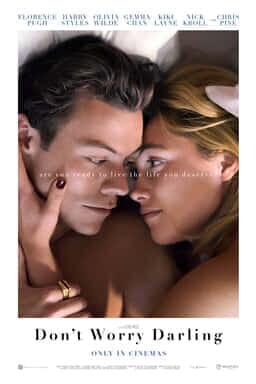‘Don’t Worry Darling,’ ‘Blonde,’ and Faux Feminism

(Image courtesy: The New Yorker)
Overview
This piece talks about the films ‘Don’t Worry Darling’ and ‘Blonde’ in an attempt to highlight the hidden misogyny that is cleverly camouflaged in them. We talk about feminist films, but somehow our storylines still follow age-old male- favoritism.
Keywords: ‘Don’t Worry Darling’, ‘Blonde’, faux feminism, misogyny.
Introduction
‘Don’t Worry Darling’ and ‘Blonde’ are recent releases that were marketed as ‘feminist films’. Thereby making me wonder, what makes a film feminist, per se? Is our concept of feminism as shallow as starring a female lead? Can we call a film feminist just because it has a female protagonist? Safely assuming it is not, it is time to open our eyes to see that these films are not feminist and we are still watching misogynistic films, under the label of feminism.
Authority over Women’s Bodies?
Don’t Worry Darling is a 2022 American psychological thriller directed by Olivia Wilde with a screenplay by Katie Silberman. For a film that is allegedly feminist, there is a sexist comment within 2 minutes into the film. Since the film depicts Alice’s captivity by her husband, it could’ve made a statement about the missing autonomy in relation to women’s bodies and their wishes.
Alice was happy in the real world, but Jack wasn’t, so he made decisions for both of them, by enrolling them in the Victory Project, without consulting her. The loose ideas of men being threatened by women’s employment, and craving submission don’t feel feminist since the storyline doesn’t build back up for better. The film was claimed to be a movie about women’s sexual pleasure when the whole basis of it (consent) was missing in it. Instead, it chooses to lazily talk about Jack’s male ego being hurt and the actions that he took to feel like ‘the man of the house’.

Source: Don’t Worry Darling
Supply Follows Demand
Blonde is a 2022 American biographical film written and directed by Andrew Dominik. The film is a fictionalized take on the life and career of American actress Marilyn Monroe. However, is it really necessary to create a film about her already-known sexual exploitation horrors? The viewer market here was the same as the one obsessed with the ‘sex symbol Marilyn Monroe’ and has nothing to do with feminism. Think about it, it is a fictional film based on a fictional book, depicting glamorous and painful parts of her life while omitting strong moments like the formation of her own production company in a male-dominated industry. One needs to question what kind of masochistic experiment is this even? A real feminist film would have focused on her growth and her success in the industry.

Source: August Man
Powerful Women Must Face Consequences?
In both films, the protagonists, Alice and Norma Jeane are disrespected and disobeyed by the men around them. It is 2022, yet the moral in the subtext of these films still promotes the thought process that strong, independent women must face the consequences of their boldness.
Conclusion
Clearly, these films have misogyny behind their feminist facade, which is why we call them faux feminists. There is an evident dichotomy between what these films claim and what they represent. It is time that Hollywood stops minting money by depicting the sexual exploitation of women in films like ‘Blonde’, under the garb of calling them feminist films.
Supply is based on demand, but don’t we really need films that are powerful enough, just like Alice and Norma Jeane were?
Citations
-
Bergeson, S. (2022, October 18). Don’t Worry Darling and Blonde: Feminist Film Debate with Nina Menkes. IndieWire. Retrieved November 4, 2022, from https://www.indiewire.com/2022/10/dont-worry-darling-blonde-feminist-films-debate-nina-menkes-1234773458/
-
O’Brien, Kerrie, et al. “Why is Hollywood still so conservative in depicting women’s pleasure?” Sydney Morning Herald, 28 October 2022, https://www.smh.com.au/culture/movies/why-is-hollywood-still-so-conservative-in-depicting-women-s-pleasure-20221018-p5bqo1.html. Accessed 14 November 2022.
-
Mehrtens, Michelle. “The Feminist Inspiration Behind ‘Don’t Worry Darling.’” Smithsonian Magazine, 22 September 2022, https://www.smithsonianmag.com/history/the-feminist-inspiration-behind-dont-worry-darling-180980810/. Accessed 14 November 2022.
-
Purcell, Carey. “’Blonde’: Is the New Marilyn Monroe Movie an Antiabortion Fever Dream?” Vanity Fair, 30 September 2022, https://www.vanityfair.com/hollywood/2022/09/blonde-is-the-new-marilyn-monroe-movie-a-pro-life-fever-dream. Accessed 14 November 2022.
-
McQuail, Alice. “Blonde review: Marilyn through the male gaze.” The Mancunion, 18 October 2022, https://mancunion.com/2022/10/18/blonde-review-marilyn-through-the-male-gaze/. Accessed 14 November 2022.